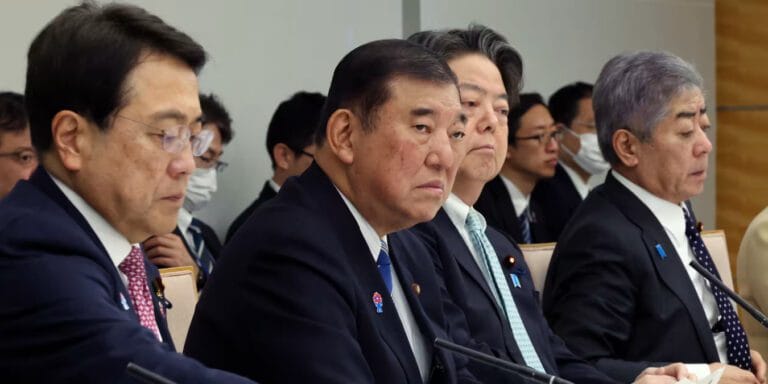🎧 Listen to This Article
Japan’s ruling coalition is facing increasing division over how to address the economic strain from rising living costs, inflation, and the uncertainty caused by U.S. tariffs. At the heart of this debate is whether to temporarily cut the country’s Consumption Tax (CT), especially on food items, as proposed by junior coalition partner Komeito.
Rising Living Costs Prompt Debate on Tax Relief
Japan’s current Consumption Tax rate stands at 10%, with a reduced 8% rate on food items. Initially raised in 2019 as part of efforts to meet the growing costs of the country’s ageing population, the Consumption Tax has now become a key point of contention in the face of inflation and rising import costs.
With elections looming—the Upper House election and Tokyo Metropolitan Assembly elections this summer—internal tensions between Japan’s ruling Liberal Democratic Party (LDP) and their junior coalition partner Komeito are intensifying. Komeito’s strong push for a temporary consumption tax cut on food items has gained traction, as rising living costs continue to burden households. However, this proposal is causing significant concern within the LDP, where fears over fiscal sustainability and the impact on long-term social security costs dominate the conversation.
Komeito’s Proposal for a Temporary Consumption Tax Cut
Tetsuo Saito, leader of Komeito, has strongly advocated for a temporary reduction in the Consumption Tax on food, calling it “the most effective measure” to provide immediate relief to families and businesses struggling with inflation and higher import prices. During a party meeting, Saito also proposed ¥100,000 cash payouts for households to supplement the tax relief, acknowledging that implementing a tax cut might take time, and immediate cash assistance would be more expedient.
“The goal is to reduce the burden on households as quickly as possible,” Saito explained, highlighting the urgent need for action given the country’s inflationary pressures.
LDP’s Caution: The Need for Fiscal Responsibility
Despite the growing calls for tax cuts, the Liberal Democratic Party (LDP) remains cautious. Senior figures, including Secretary-General Hiroshi Moriyama, are resisting the tax cut proposals, fearing it could undermine Japan’s social security system. “What part of social security could we ask people to give up?” Moriyama said, emphasizing that the Consumption Tax plays a crucial role in funding social welfare programs for Japan’s ageing population.
The LDP’s opposition to a tax reduction reflects deep concerns about fiscal sustainability. Cutting the consumption tax could result in significant revenue losses, making it more difficult to cover Japan’s ballooning social costs.
However, the proposal has gained traction among some LDP lawmakers, particularly those seeking re-election. They argue that a tax cut is necessary to avoid electoral backlash and maintain public support. One mid-career LDP lawmaker critical of Moriyama remarked, “To win the elections, we have no choice but to cut taxes.”
Prime Minister Ishiba’s Wavering Stance
Prime Minister Shigeru Ishiba has remained at the center of the debate. Initially, Ishiba indicated that he had no intention of categorically opposing the consumption tax cut, but he later reversed his stance, stating that the cut would be inappropriate. However, Ishiba left the door open to future discussions, indicating that he would continue to consult party members on the issue.
Ishiba’s shifting position highlights the political complexity of the issue. As election season approaches, tax relief is becoming a more pressing concern, but any move to reduce the Consumption Tax could trigger unintended consequences, both politically and economically.
Economists and the Finance Ministry Weigh In
Economists are also divided on the issue, with some arguing that the government should act more cautiously. Instead of rushing into tax cuts or cash handouts, experts suggest that the government may want to consider alternative forms of support, such as loans to small businesses, especially as the long-term economic effects of the U.S. tariffs remain uncertain.
The Finance Ministry has also raised concerns, warning that a zero tax rate on food items could lead to an estimated ¥5 trillion in lost revenue. Given Japan’s already high public debt, the impact of such a policy could be severe, making it an unsustainable option in the long run.
The Road Ahead: A Delicate Balancing Act
As Japan prepares for the summer elections, the debate over the Consumption Tax cut reflects the growing pressures on the country’s government to address rising living costs while ensuring fiscal stability. On one hand, there is public demand for immediate relief, but on the other, there are concerns about the long-term economic consequences of cutting taxes and potentially undermining the social security system.
For now, the debate continues to evolve, with some political factions pushing for quick action, while others caution against rushing into decisions that could have far-reaching implications.
For further details, clarification, contributions, or any concerns regarding this article, please contact us at editorial@tax.news. We value your feedback and are committed to providing accurate and timely information. Please note that our privacy policy will handle all inquiries



